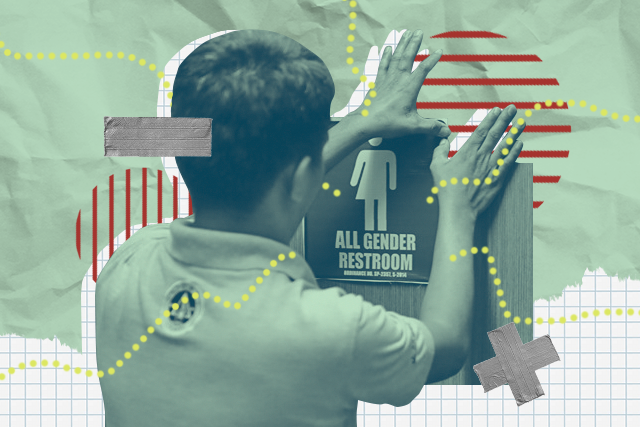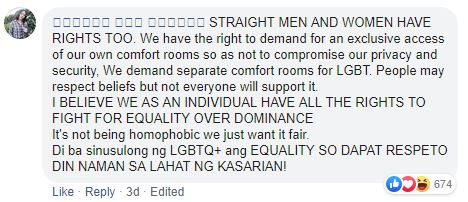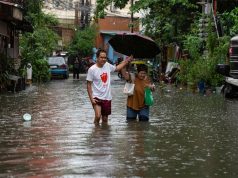
The recent installation of “gender all” signs in public restrooms in Quezon City in accordance to a local ordinance fueled arguments on the idea of having a third gender-neutral washroom for those who would prefer to use one.
A staff of the Quezon City Hall placed an “all gender” sign at a restroom in the agency’s compound as shown in photos shared by the social accounts of Quezon City’s Public Affairs last August 24.
This was in compliance with the City Ordinance 2357-2014 or the Gender-Fair Ordinance, the city’s anti-discrimination policy based on Sexual Orientation, Gender Identity and Expression, or SOGIE.
Section 5 of the measure requires “government agencies, private offices, and commercial and industrial establishments to designate all-gender toilet rooms.”
A general services staff of Quezon City Hall places an “All Gender” sign in a restroom of the city hall compound.The…
Posted by Quezon City Public Affairs Department on Friday, August 23, 2019
Some Filipinos, however, felt uncomfortable over the move since it happened weeks after a harassment incident at a mall in the city made headlines early this August.
They urged Quezon City Mayor Joy Belmonte to focus on other pressing issues in the city.

Others who are wary over transgender men and women using washrooms for the gender they identify with expressed support to establishments that would designate gender-neutral washroom.

A Facebook user, meanwhile, took a different spin to it wherein he feared the possibility on a safe space for taking illegal drugs in the future.
His post on Facebook was deleted, but a Twitter user was able to make screenshots of it, criticizing the flawed logic used.
I am not sorry ang bobo mo JM pic.twitter.com/c9POolHi7w
— Justin Naredo (@JustinFrancPoid) August 26, 2019
The third restroom debate came after transgender woman Gretchen Diez decried being harassed and shamed by the mall personnel of Farmer’s Plaza at Araneta Center for choosing the women’s only restroom to use.
Diez and the janitress shown in Diez’s posts soon became the subjects of one headline after another.
Following this incident, some Filipinos campaigned for transgender people’s access to public restroom use on social media.
Several studies based in the United States also found that their preferences for public bathrooms found no reported risks for either men or women.
It also sparked renewed calls for the immediate passage of the SOGIE Equality bill, a comprehensive anti-discrimination policy pending in Congress.
Third restroom?
President Rodrigo Duterte, whom Diez also previously met along with other lawmakers, proposed the idea of a third restroom exclusive for LGBT people to solve the problem.
“He’s (Duterte) also inclined doon sa third restroom for them, mayroon silang sarili,” presidential spokesperson Salvador Panelo said.
Panelo, meanwhile, would prefer restrooms that can be used by everyone regardless of gender identity.
Building a separate toilet was also the same suggestion of 1-PACMAN party-list Representative Eric Pineda to prevent any similar fiasco in the future.
However, Diez disagreed with these plans. She said she was fighting for is acceptance for members of the LGBT community.
“It’s not about changing the establishment or the infrastructure. It’s about changing the mindset of the people,” she said in an interview.
Gender-neutral toilets in the Philippines
The debate on public toilet policies becomes more heated online when establishments and organizations are reported to be designating separate all-gender restrooms.
Rather than support, such initiatives do not seem to satisfy those who are both sides of the debate, earning further criticisms from both conservative Filipinos online and advocates for LGBT rights.
These places include Ateneo de Manila University in Quezon City, St. Louis University in Baguio, Ateneo de Davao and the branch of Pilipinas Shell Petroleum in Batangas. — Artwork by Uela Altar-Badayos









